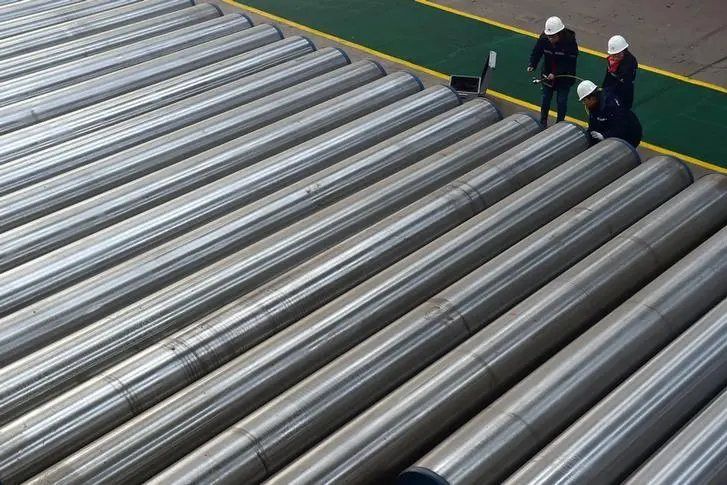PHOTO
Bahrain Steel, a leading producer of iron ore pellets and a 100-per-cent-owned company of the Bahrain-based Foulath Holding, is planning to double its output over the next 10 years.
Bahrain Steel operates two pelletising plants in the kingdom, making it a leading producer of iron ore pellets used in the production of steel. Last year (2018), the company passed the milestone of having produced 100 million tonnes of pellets since its inception in 1989.
“We are forecasting a major increase of production by Bahrain Steel this year,” Khalid Al Bassam, chairman of Bahrain Steel and its parent company, Foulath Holding, said at a conference commemorating the company’s 30 years of production.
“Thirty years of production is an important celebration for Bahrain Steel.This milestone represents not only what we have achieved over the past three decades, but also our standing in the regional and international iron and steel business. We are, today, the world’s largest merchant pelletiser, meaning that unlike other pellet producers, we are independent from any iron ore mine, and are free to choose the most suitable ores from around the world to produce the pellets required by our customers.”
The company has been slowly ramping up its capacity in the last few years. From the initial 5.5 million tonnes output, Bahrain Steel produced 8 million tonnes of iron ore pellets in 2018, gaining a 26 per cent market share in the GCC and an enviable record for quality output. In the current year, it plans to utilise its full installed capacity of 12 million tonnes.
“For a long time, we have not been able to ramp our capacity. We were always averaging our capacity around 5 to 5.5 million tonnes. Last year, we achieved the highest output at 8 million tonnes. Going forward, we want to achieve 100 per cent capacity,” Dilip George, group chief executive of Bahrain Steel and Foulath Holding said.
This follows the company’s decision to sign a 20-year iron ore supply agreement with Anglo American Marketing Company (AAML), which will ensure smooth and quality supply of raw materials to Bahrain Steel, according to George.
George added: “Our main constraint to ramp up was the non-availability of quality iron ore which is the raw material for making pellets.The signing of this new agreement will allow us to utilise our full installed capacity of 12 million tonnes.
“The negotiations and the drafting of this new agreement are now in the end stages of completion, and the new agreement is expected to be finalised and signed, at a ceremony next month."
AAML, George said, has already supplied 1 millio tonne in the first quarter of the current year and will supply 5 million tonnes for the full year.
Of its total production, Bahrain Steel supplies 20 per cent to its sister company Sulb. The rest is supplied to steelmakers throughout the world but the key focus is the GCC market which has an estimated demand of 22 million tonnes.
The company, which claims to have a 26 per cent market share of the GCC market, is looking at capturing new markets in the GCC and North Africa.
“The total size of the GCC market alone is 22 million tonnes. The market is huge. It is only the raw materials that is constraining us,” George added.
Other than the GCC, Bahrain Steel, he said, will be targeting North Africa as there are new plants coming up the region. The company is currently in negotiations with a new plant coming up in Algeria. In Egpyt, it already supplies to Ezz Dekheila Steel Company Alexandria (EZDK) and is looking at other plants as well.
Meanwhile, the company is also going to expand its stockyard capacity to support its increased production. “As we grow our capacity we need to expand our storage capacity,” Geroge said.
Towards this, the company is planning to invest about $60 million to $70 million in additional land. “We are talking to the Ministry of Industry. They have promised us to allocate this land next to where we are located in Hidd Industrial Area,” he added.
The land will have to reclaimed from sea and will take about 1 year to be developed, George said.
Based on a 1.3 million sq km site at Hidd, Bahrain Steel and other companies of Foulath represent an investment of $3.5 billion.
According to George, the group contributes about 4 per cent to Bahrain’s GDP and 25 per cent to Bahrain’s non-oil exports which are about $6 billion in value annually.
Bahrain Steel, he said, is one of the biggest employers in the kingdom and employs 465 members of staff, roughly 46 per cent of whom are Bahraini. - TradeArabia News Service
Copyright 2019 Al Hilal Publishing and Marketing Group Provided by SyndiGate Media Inc. (Syndigate.info).
Disclaimer: The content of this article is syndicated or provided to this website from an external third party provider. We are not responsible for, and do not control, such external websites, entities, applications or media publishers. The body of the text is provided on an “as is” and “as available” basis and has not been edited in any way. Neither we nor our affiliates guarantee the accuracy of or endorse the views or opinions expressed in this article. Read our full disclaimer policy here.





















